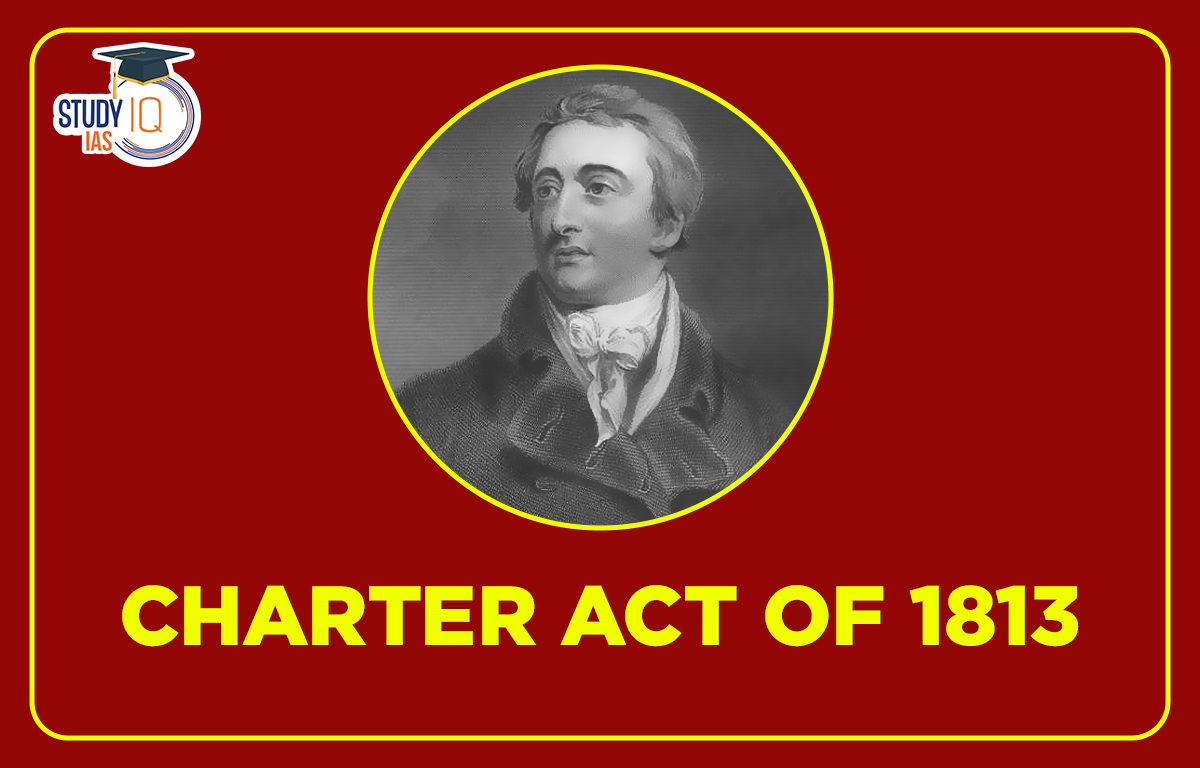Table of Contents
What is Charter Act of 1813?
The East India Company’s monopoly in India was ended by the Charter Act of 1813, commonly known as the East India Company Act of 1813. It maintained the British East India Company’s authority in India and renewed its charter. However, the monopoly was limited to the opium and tea sectors and trade with China, demonstrating the growth of British dominance in India.
Christian missionaries were able to share their beliefs in English according to a charter act from 1813. This article goes into great detail about the topic “Charter act of 1813,” which is a significant component of the syllabus for the Indian Polity and Governance section of the UPSC/IAS Exam.
Charter Act of 1813 Historical Background
The Continental System in Europe under Napoleon Bonaparte hurt British businessmen and merchants (which barred the import of British goods into French allies in Europe). They thus requested a piece of British trade in Asia and an end to the monopoly of the East India Corporation, which the company rejected.
Finally, with the Charter Act of 1813, the company maintained its monopoly in commerce with China and the tea trade but enabled British merchants to conduct business in India with severe licensing requirements. The Act also increased the jurisdiction of Indian province governments and courts over subjects of the British Empire and made funds available to support the resurgence of Indian literature and the advancement of science.
Charter Act of 1813 Provisions
This Act established the Crown’s authority over the British colonies in India. The corporation’s reign was extended for an additional 20 years. Their commercial monopoly was destroyed, with the exception of commerce with China, tea, and opium. The Supreme Court’s authority over those who were taxed was expanded, and the company’s dividend was fixed at 10.5 percent.
The Act gave Indian courts more control over British citizens living in Europe. The freedom to visit India and spread their religion was also granted by this edict. The missionaries were successful in getting a Bishop for British India appointed in conformity with the Act, with his headquarters in Calcutta.
The act mandated increased corporate accountability for the education of the Indians under their control as well as a financial grant to assist the revival of Indian literature and scientific research. One lakh rupees was determined to be set aside for this.
Charter Act 1813 Features
The East India Company’s hegemony over India was broken by the Charter legislation of 1813. On the trade in tea, opium, and with China, however, the East India Company still held the monopoly. 20 more years were added to the company’s rule.
The Crown’s authority over British colonies in India was affirmed by the Charter Act of 1813. The Act gave authority to Christian missionaries who wanted to travel to India in order to spread their religion and encourage moral development. The Act also gave municipal governments the authority to impose taxes on citizens, subject to Supreme Court oversight. It increased the authority of Indian courts over British people in Europe.
The Charter Act of 1813 imposed penalties on anybody who failed to pay taxes. The company’s territorial income and commercial profits were governed under the Charter Act of 1813. The corporation’s dividend was set at a fixed 10.5%. The clause required keeping the commercial and territorial accounts separate. The Act also required the Company to invest one lakh rupees annually in the education of Indians. The law established a cash award program for advancing research and reviving Indian literature.
Read about: Pitt’s India Act 1784
Charter Act 1813 Significance
Shareholders of the corporation got a dividend of 10.5% on India’s sales. Without jeopardizing the Crown’s authority, the East India Company had to maintain territory hold and financial gains for a further 20 years. Thus, for the first time, the constitutional position of British colonies in India was properly articulated.
The power of the Board of Control was increased. Each year, one lakh rupees were to be set up for the promotion, development, and encouragement of Indian literature, education, and science. This was a key clause in terms of the state’s obligation to provide for education.
Now the British Parliament must be presented with the Madras, Bombay, and Calcutta Councils’ regulations. As a result, the constitutional nature of British territories in India was first established. Revenues from the territories and commercial activities were to be held in separate accounts. The Board of Control’s authority for direction and monitoring was clarified and significantly enhanced. Additionally, it was permitted for Christian missionaries to spread their religion throughout India.
Charter Act 1813 UPSC
The Charter Act of 1813 established and increased the direction and oversight responsibilities of the Board of Control. The provision of a sum of rupees one lakh per year for the resuscitation and advancement of literature, encouragement of India’s learned natives, as well as the introduction and promotion of scientific knowledge among the inhabitants of British Indian territories, was one of the Charter Act of 1813’s most significant provisions.
This marked the beginning of the idea of state responsibility for education. One of the British government’s most important measures in regard to India was, without a doubt, this sentence.
In the history of modern India, the Charter Act of 1813 is significant. Over time, the UPSC Prelims and UPSC Mains GS Paper-1 have both included questions from the Charter Act 1813. A candidate must be well-versed in the Indian History Notes for UPSC in addition to reading the UPSC Book and the NCERT Books for UPSC in order to cover this topic.


 Important Lakes of India, State wise and...
Important Lakes of India, State wise and...
 Buddhism History, Origin, Sect, Councils...
Buddhism History, Origin, Sect, Councils...
 Andaman and Nicobar Islands, History, Cl...
Andaman and Nicobar Islands, History, Cl...





















